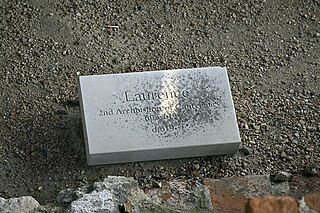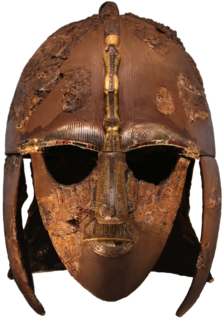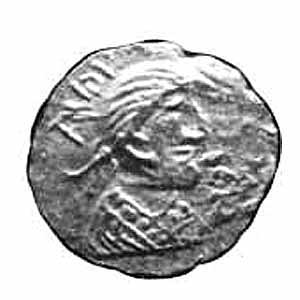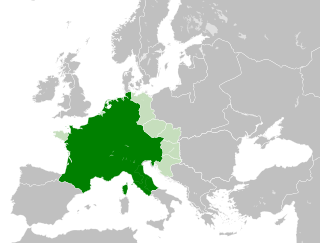
Augustine of Canterbury was a Benedictine monk who became the first Archbishop of Canterbury in the year 597. He is considered the "Apostle to the English" and a founder of the English Church.

Ceawlin was a King of Wessex. He may have been the son of Cynric of Wessex and the grandson of Cerdic of Wessex, whom the Anglo-Saxon Chronicle represents as the leader of the first group of Saxons to come to the land which later became Wessex. Ceawlin was active during the last years of the Anglo-Saxon expansion, with little of southern England remaining in the control of the native Britons by the time of his death.

Laurence was the second Archbishop of Canterbury from about 604 to 619. He was a member of the Gregorian mission sent from Italy to England to Christianise the Anglo-Saxons from their native Anglo-Saxon paganism, although the date of his arrival is disputed. He was consecrated archbishop by his predecessor, Augustine of Canterbury, during Augustine's lifetime, to ensure continuity in the office. While archbishop, he attempted unsuccessfully to resolve differences with the native British bishops by corresponding with them about points of dispute. Laurence faced a crisis following the death of King Æthelberht of Kent, when the king's successor abandoned Christianity; he eventually reconverted. Laurence was revered as a saint after his death in 619.

Mellitus was the first Bishop of London in the Saxon period, the third Archbishop of Canterbury, and a member of the Gregorian mission sent to England to convert the Anglo-Saxons from their native paganism to Christianity. He arrived in 601 AD with a group of clergy sent to augment the mission, and was consecrated as Bishop of London in 604. Mellitus was the recipient of a famous letter from Pope Gregory I known as the Epistola ad Mellitum, preserved in a later work by the medieval chronicler Bede, which suggested the conversion of the Anglo-Saxons be undertaken gradually, integrating pagan rituals and customs. In 610, Mellitus returned to Italy to attend a council of bishops, and returned to England bearing papal letters to some of the missionaries.

Rædwald, also written as Raedwald or Redwald, was a 7th-century king of East Anglia, a long-lived Anglo-Saxon kingdom which included the present-day English counties of Norfolk and Suffolk. He was the son of Tytila of East Anglia and a member of the Wuffingas dynasty, who were the first kings of the East Angles. Details about Rædwald's reign are scarce, primarily because the Viking invasions of the 9th century destroyed the monasteries in East Anglia where many documents would have been kept. Rædwald reigned from about 599 until his death around 624, initially under the overlordship of Æthelberht of Kent. In 616, as a result of fighting the Battle of the River Idle and defeating Æthelfrith of Northumbria, he was able to install Edwin, who was acquiescent to his authority, as the new king of Northumbria. During the battle, both Æthelfrith and Rædwald's son Rægenhere were killed.
The 590s decade ran from January 1, 590, to December 31, 599.

Year 590 (DXC) was a common year starting on Sunday of the Julian calendar. The denomination 590 for this year has been used since the early medieval period, when the Anno Domini calendar era became the prevalent method in Europe for naming years.

Offa was King of Mercia, a kingdom of Anglo-Saxon England, from 757 until his death in July 796. The son of Thingfrith and a descendant of Eowa, Offa came to the throne after a period of civil war following the assassination of Æthelbald. Offa defeated the other claimant, Beornred. In the early years of Offa's reign, it is likely that he consolidated his control of Midland peoples such as the Hwicce and the Magonsæte. Taking advantage of instability in the kingdom of Kent to establish himself as overlord, Offa also controlled Sussex by 771, though his authority did not remain unchallenged in either territory. In the 780s he extended Mercian Supremacy over most of southern England, allying with Beorhtric of Wessex, who married Offa's daughter Eadburh, and regained complete control of the southeast. He also became the overlord of East Anglia and had King Æthelberht II of East Anglia beheaded in 794, perhaps for rebelling against him.

Æthelbald, King of Wessex was the second of five sons of King Æthelwulf of Wessex. In 850 Æthelbald's elder brother Æthelstan defeated the Vikings in the first recorded sea battle in English history, but he is not recorded afterwards and probably died in the early 850s. The next year Æthelwulf and Æthelbald inflicted another defeat on the Vikings at the Battle of Aclea. In 855 Æthelwulf went on pilgrimage to Rome and he appointed Æthelbald king of Wessex, while Æthelberht, the next oldest son, became King of Kent, which had been conquered by Wessex thirty years earlier. When Æthelwulf returned to England in 856, Æthelbald refused to give up the crown. Most historians believe that Æthelbald continued to be king of Wessex while Æthelberht gave up Kent to his father, but some scholars think that Wessex itself was divided, with Æthelbald ruling the west and his father the east, while Æthelberht kept Kent. When Æthelwulf died, in 858 Æthelbald continued as king of Wessex and his brother resumed his kingship of Kent.

Æthelberht was the King of Wessex from 860 until his death in 865. He was the third son of King Æthelwulf and his first wife, Osburh. Æthelberht was first recorded as a witness to a charter in 854. The following year Æthelwulf went on pilgrimage to Rome and appointed his oldest surviving son, Æthelbald, as king of Wessex while Æthelberht became king of the recently conquered territory of Kent. Æthelberht may have surrendered his position to his father when he returned from pilgrimage, but resumed the south-eastern kingship when his father died in 858.

Year 580 (DLXXX) was a leap year starting on Monday of the Julian calendar. The denomination 580 for this year has been used since the early medieval period, when the Anno Domini calendar era became the prevalent method in Europe for naming years.

Eadbald was King of Kent from 616 until his death in 640. He was the son of King Æthelberht and his wife Bertha, a daughter of the Merovingian king Charibert. Æthelberht made Kent the dominant force in England during his reign and became the first Anglo-Saxon king to convert to Christianity from Anglo-Saxon paganism. Eadbald's accession was a significant setback for the growth of the church, since he retained his people's paganism and did not convert to Christianity for at least a year, and perhaps for as much as eight years. He was ultimately converted by either Laurentius or Justus, and separated from his first wife, who had been his stepmother, at the insistence of the church. Eadbald's second wife was Emma, who may have been a Frankish princess. She bore him two sons, Eormenred and Eorcenberht, and a daughter, Eanswith.
Sæberht, Saberht or Sæbert was a King of Essex, in succession of his father King Sledd. He is known as the first East Saxon king to have been converted to Christianity. The principal source for his reign is the early 8th-century Historia Ecclesiastica gentis Anglorum by Bede, who claims to have derived his information about the missionary work of Mellitus among the East Saxons from Abbot Albinus of Canterbury through the London priest Nothhelm, later Archbishop of Canterbury. Other sources include the Anglo-Saxon Chronicle, an East Saxon genealogy possibly of the late 9th century, and a handful of genealogies and regnal lists written down by Anglo-Norman historians.
Wihtred was king of Kent from about 690 or 691 until his death. He was a son of Ecgberht I and a brother of Eadric. Wihtred ascended to the throne after a confused period in the 680s, which included a brief conquest of Kent by Cædwalla of Wessex, and subsequent dynastic conflicts. His immediate predecessor was Oswine, who was probably descended from Eadbald, though not through the same line as Wihtred. Shortly after the start of his reign, Wihtred issued a code of laws—the Law of Wihtred—that has been preserved in a manuscript known as the Textus Roffensis. The laws pay a great deal of attention to the rights of the Church, including punishment for irregular marriages and for pagan worship. Wihtred's long reign had few incidents recorded in the annals of the day. He was succeeded in 725 by his sons, Æthelberht II, Eadberht I, and Alric.

The Gregorian mission or Augustinian mission was a Christian mission sent by Pope Gregory the Great in 596 to convert Britain's Anglo-Saxons. The mission was headed by Augustine of Canterbury. By the time of the death of the last missionary in 653, the mission had established Christianity in southern Britain. Along with the Irish and Frankish missions it converted other parts of Britain as well and influenced the Hiberno-Scottish missions to Continental Europe.

Domne Eafe, also Domneva, Domne Éue, Æbbe, Ebba, was, according to the Kentish royal legend, a granddaughter of King Eadbald of Kent and the foundress of the double monastery at Minster-in-Thanet during the reign of her cousin King Ecgberht of Kent. A 1000-year-old confusion with her sister Eormenburg means she is often now known by that name. Married to Merewalh of Mercia, she had at least four children. When her two brothers, Æthelred and Æthelberht, were murdered she obtained the land in Thanet to build an abbey, from a repentant King Ecgberht. Her three daughters all went on to become Abbesses and saints, the most famous of which, Mildrith, ended up with a shrine in St Augustine's Abbey, Canterbury.
The Christianisation of Anglo-Saxon England was a process spanning the 7th century. It was essentially the result of the Gregorian mission of 597, which was joined by the efforts of the Hiberno-Scottish mission from the 630s. From the 8th century, the Anglo-Saxon mission was, in turn, instrumental in the conversion of the population of the Frankish Empire.
Ingoberga was the first wife of the Frankish king Charibert I. Her own lineage has not been determined.

















